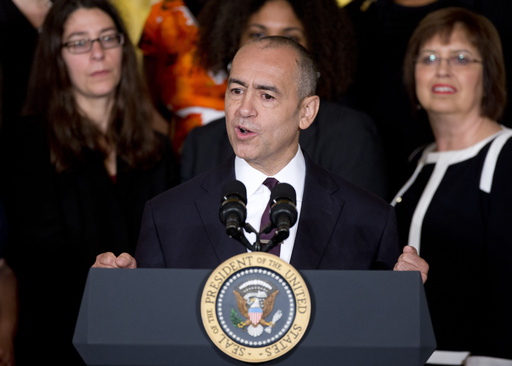
CORAL GABLES, Fla. — Joe Echevarria, the president of the University of Miami, has been a dedicated Miami football fan since 1978, the year he completed his studies there. He currently enjoys premium seating in the field club behind one of the goalposts, yet he often opts for a different experience on game days. Rather than utilizing his luxury seats or a suite that comes with his presidential role, Echevarria prefers the sidelines during Hurricanes games, where he embraces his fan spirit, often offering unsolicited advice to the coaching staff, including urging offensive coordinator Shannon Dawson to focus on running plays more frequently.
As Miami, currently ranked No. 4 with an impressive record of 9-0 and 5-0 in the Atlantic Coast Conference, prepares for an away game against Georgia Tech, Echevarria will be right where he feels most at home—on the sidelines. “I’m one of those crazed fans,” he shares. “I need to pace. I need to process. I need to lament. All the second-guessing that fans do, that’s me. I just don’t say it out loud, I say it to myself. And I love being close to my students and the team; they are my students, just like the student section.”
Having joined the University community as a teenager from the South Bronx about five decades ago, Echevarria officially became the seventh president of Miami last month. He is an alumnus of the university, who after graduating, started his career as an accountant at Deloitte, eventually rising to the role of CEO at the firm. He recalls that his interview for the Deloitte position took place right on his alma mater’s campus. Echevarria has participated on several boards and served as the CEO of the university’s health system before stepping into the presidency.
He played a significant role in the return of Mario Cristobal, a Miami native and former Hurricanes player, to lead the football program. Echevarria successfully attracted Cristobal back from a lucrative deal in Oregon, offering him a standout 10-year contract worth $80 million to become the head coach of the Hurricanes in December 2021. “It starts with him being an elite human being and a legitimate difference maker,” Cristobal stated, acknowledging the impact Echevarria has had. “I would not have hopped on a plane to come to Miami without the presence of our current president.”
Echevarria, however, quickly credits his accomplishments to teamwork, avoiding the limelight and preferring to work collaboratively. “I was part of a larger team. What it meant to me was personal and emotional for me to hear Mario say it because Mario is Mario. I was part of something magical, no matter how this turns out.”
His enthusiasm isn’t limited just to football; he maintains season tickets for men’s basketball, women’s basketball, and baseball as well. Despite this, he never uses his purchased seats, often standing during games due to his nervousness and excitement. His desire to be close on game days stems from a key lesson learned during his time at Deloitte, where he discovered that the best decisions must be made at ground level where the action unfolds. “I’m happy to serve because it’s personal for me and it’s pure joy,” he expressed, reflecting on his commitment to the university across various domains—academic excellence, health systems, and athletics.
Echevarria’s journey from growing up in a minority community in the inner city to his professional achievements, including a corner office atop a Manhattan skyscraper, is a source of immense pride. The university has radically changed his life, providing opportunities and the confidence to succeed. He radiates enthusiasm when discussing his experiences with students, faculty, and donors. As the football team reaches for an ACC championship and possibly greater aspirations, Echevarria emphasizes that his main priority remains firmly on the university’s mission.
“It’s the mission first, always: Our students, our patients, our research, and who delivers the mission? My faculty,” he remarked. “My coaches are faculty for the athletic part. The faculty takes care of the students academically, while coaches fulfill their role in athletics. It’s all about striving for excellence in everything we do.”
